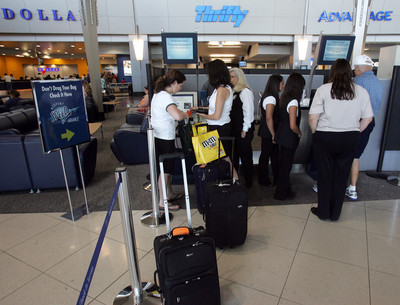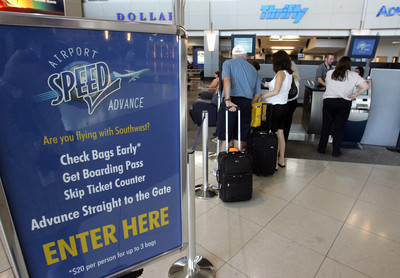AROUND THE WORLD IN 80 (NEW) WAYS
There isn't a technology on Earth to bypass clueless terminal dawdlers or freshen smelly airline seat-mates. But software, systems and gizmos on hand this week in Las Vegas can at least minimize your exposure to those and other nuisances that make air travel miserable.
The technology talk at the Check-In 2007 travel trade show included everything from chatter about using radio-frequency tags to track luggage to off-site airline bag checks to discussions about boarding passes distributed by mobile phones.
Some of the technology, like remote check-in and radio tags, is already in use in Las Vegas. Other advances highlighted at the two-day conference at Mandalay Bay are on the way.
Eventually, as products and ideas from the show go global, air travel will start to look a lot different.
"We'll see a move away from the traditional ticket counter," said Samuel Ingalls, assistant director of aviation for information systems at McCarran International Airport. "That is really becoming a dinosaur."
McCarran is already one of fewer than 80 airports worldwide that offer common use systems for gate agents, customers and even for parking airplanes.
Ingalls estimates the concept of sharing gates, customer check-in kiosks and ticket counters between airlines has boosted capacity at McCarran by 15 percent, something that takes on added significance considering the airport is stretched to the limit with about 46 million arrivals and departures annually.
Although it takes technology to make the airlines' systems work on a shared network, the biggest innovation may have been convincing airlines to share terminal space and equipment in the same manner they share the airfield.
"Out in the airfield, airports have always been common use," Ingalls said. "It would be ridiculous to think you should have 20 different runways each serving a different airline."
Some of the more futuristic ideas at the conference included technology to issue boarding passes by mobile phones.
The concept is a step beyond online boarding passes people print from their computers at work or home.
Alaistair Deacon, director of technology for Real Time Engineering Ltd. of Glasgow, Scotland, displayed one of the boarding passes on the screen of his mobile phone.
"The bar code scanner can read that right off the screen," Deacon said, explaining how airline agents would verify the mobile ticket. "That is exactly the same as a piece of paper you print at home but you don't have to remember to print it out."
Airlines in Canada and Spain are already experimenting with the mobile technology, Deacon said.
He said customers would adapt to mobile boarding passes the way they accepted print-at-home versions.
"Suddenly, once the momentum started, over a span of about 12 months, we went from a few airlines (using it) to very many airlines," he said.
Another change air travelers can expect is broader use of off-site check-in for baggage.
In Las Vegas, a company called Bags to Go operates an off-site service that for $20 allows people to check bags from the Las Vegas Convention Center, the Luxor, The Venetian and the McCarran Rent-A-Car Center.
Since its inception last year, nearly 11,700 people have used the service. But with only two airlines, Southwest and United, participating so far, the service is limited. Since April, bag checkers have turned away more than 35,000 people who couldn't use the service because they weren't on a participating airline.
Rosemary Vassiliadis, deputy director of the Clark County Department of Aviation, said more airlines are lining up for the service and the goal is to eventually have 10 percent of customers use the system, called SpeedCheck Advance.
She also envisions check-in sites at off-Strip locations to encourage more locals to use the service. Sites could be positioned at locals casinos, park-and-ride lots or anyplace else that is convenient.
"There are many pretty easy places where we think locals will take advantage of the service," she said.
Passengers aren't the service's only fans. Casino operators eager to squeeze as much revenue as possible from every customer like it, too.
"The ability to stay on-site is quite lucrative for our property," said Damian Carrasco, guest services manager at the Luxor. "They can gamble longer."


















